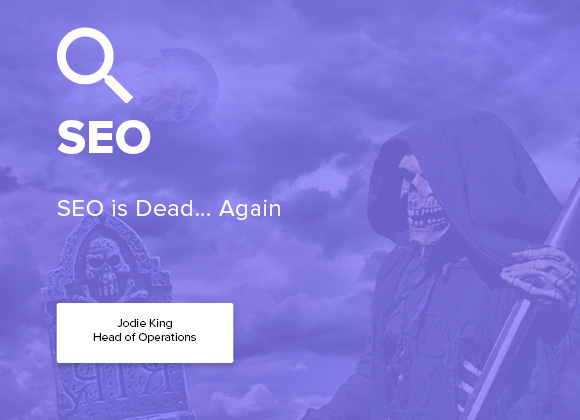I am not sure if this phrase is deliberate now to simply garner search traffic..that makes it a little ironic don’t you think?
There are people who would argue energetically that SEO is dead, it died last year…and the year before. Perhaps the better question is…was it ever alive?
Their arguments are usually around two points:
- SEO leans heavily on other areas to be effective like user experience, content marketing and web development so it isn’t anything in its own right
- SEO was a science that you could use to outmanoeuvre Google and trick the search engines to champion your site for you, which you cannot do any more
Neither of those are true. Not one bit. I will contest their validity with anyone.
I am an SEO – how many professions can you use its title as your job role. I’m an SEO. Not an expert or practitioner or wizard.
Nobody says I’m a Google Shopping, I’m a Facebook…you get the idea.
And that is because SEO is in everything – it is like air in digital marketing. You cannot create anything without breathing in its molecules. I will rephrase – you cannot create anything good!
SEO is not dead and here are three reasons it will live on:
- Yes, SEO is heavily dependant on creating great content. But a piece of content with no keyword research, semantic meaning, competitor research and the linked optimisation just clutters the web. Another piece of unread, unshared, traffic less baggage for your website to cling onto.
- Google’s RankBrain can detect keyword overuse and stuffing and these days we are all about semantic meaning and original content. So rather than SEO being dead what you mean is it has become harder. You cannot solely rely on keyword research alone because you have to factor in phrases and related words. RankBrain is a powerful form of artificial intelligence but it isn’t human – the only way it can determine what something is talking about is if it has signposts and that means words.
- Google changes quickly and there are over 200 ranking factors and nobody truly knows which impact their site most. So an SEO audit and an analysis of all three sections – technical, on-page and off-page is the only way to narrow that window down. You may find dwell time issues, conversion problems, duplicate copy, poor brand awareness contribute to your site underperforming but only an SEO audit looks at everything. Those metrics are all relevant to SEO so sure it is a vast area but that actually makes it more alive than ever.
SEO : What Does It MeanThis is really what it boils down to. What does SEO mean in 2018 and for the future?
The reality is that Google does appear to be more of a threat to organic rankings than ever before. They are geared up to satisfy user intent and some have started seeing a ‘no click’ future. On a mobile device, the Ad space is bigger and the knowledge boxes combined with the 3 pack and voice search means people are less likely to click. A user’s questions are being answered with such immediacy that great content isn’t always enough. It is getting tougher but that is more about our mindset than Google’s actions. We still link SEO to single keywords and spammy backlinks. Just because it is more difficult and Google have had a Spring clean and cleared the attic of crap – doesn’t mean there is no opportunity. This is what we know:
So Search Engine Optimisation is about fine-tuning every aspect of your digital marketing. Whether that is optimising a YouTube title or writing a large format piece of content for your blog SEO plays a part. It is about optimising your content for:
|
SEO Meta Tags 2018
This is an area that has changed quite a bit over the last four years. Meta titles used to be optimised for the keyword and anything else was a bonus. Now it is more about the language. Your titles need to have:
- The keyword in them – yep surprise surprise our data still says that this is essential for rankings so RankBrain isn’t a mind reader….oh keywords might be important then?
- A call to action – you really really need that click because Google pays a lot of attention to content that they serve up and nobody clicks on
- It has to be genuine and relevant to the page it clicks through to – Google pays even more attention to SERPs that are clicked on but do not satisfy the user so they bounce off the page and click on your competitors link
Everything that quality score applies to search Ads is relevant to SEO. Imagine your organic listings as Ads. How can you make your link more enticing and more relevant to your page that those that surround it? Winning the click means winning the rankings war – simple.
SEO Hacks 2018-2020 |
Inevitably we all want a life hack and SEO is no different. So what are my SEO hacks for 2018-2020?
eCommerce stores struggle to get the copy on their websites especially when they are busy fulfilling orders at manic periods of the year.
Focus your efforts on your product pages.
A product page that has a relevant optimised copy will help you rank for searches that are more likely to convert and they will also enhance the quality score of any Ads you have running. It also raises the prestige of your entire site because Google can see fresh content going on. Start with your best sellers and work your way out.
Make sure you store is fast.
People shop in a rush and get immediately impatient these days if they meet a delay of more than just 2 seconds. So make your store fast – this one can really boost rankings on slow websites.
Check Mobile Responsive Elements.
Your site should be mobile responsive and there are certain areas that can cripple your business.
Does your menu follow your shopper around so they have access to a simple navigation?
Is your search dynamic so if they can’t find something you can teleport them straight to it?
Are your buttons easy to click or are they too close together/fiddly?
Is the checkout experience on one page and do you have a guest checkout/PayPal/Amazon pay for a speedy checkout?
Technical SEO quick wins.
Make sure you use canonicals or redirects to avoid duplicate content. Also, add your search results and filters to robots.txt to again avoid the duplicate copy. These are easy fixes in most cases for a web developer and can stop your key pages competing against themselves.
Add the schema to your site and make sure you set it up correctly. This is still underused and highlights key information for Google to pull from your site and present in SERPs.
Content cannot be hacked.
A word of warning. SEO relies on content and product pages are a great way of getting that on eCommerce stores. But if you can write articles, create videos and throw in a guide for a great landing page experience then you will certainly benefit from it.
Your content must include keywords sparingly alongside latent semantic keywords (words related to your initial word). You need to answer questions, reply to your audiences pain points and create copy that excels that of your competitors. Be creative and go big. This is one area where hacking anything will just sabotage your efforts.
What are SEO PrinciplesSo moving forward there are two principles of SEO that cannot be ignored. One of them is not a surprise and the other we have always known and driven towards. If all you ever did was try to game the system and cheat Google then you took on a multi-billion pound business so it was only ever going to end one way. They outsmarted you and your tactics are dead. That didn’t kill SEO though. Here are the two SEO principles to live by – I think these are forever rules too so they do not have a use by date:
|
So now you know. SEO is alive and it isn’t going anywhere. The hacks have died and the world’s obsession with keywords lingers but most are catching on that a word can only convey so much.
Google’s artificial intelligence is insulted by single words so try not to upset the one company that can kill SEO if it so wishes and it can also kill your business.
Stay clean and create killer content!





